| |
Date |
Event(s) |
| 1 | 1797 | |
| 2 | 1798 | |
| 3 | 1800 | - 1800—1800: Electric light first produced by Sir Humphrey Davy
- 1800—1800: Use of high pressure steam pioneered by Richard Trevithick (1771-1833)
- 1800—1800: Royal College of Surgeons founded
- 1800—1800: Herschel discovers infra-red light
- 1800—1800: Volta makes first electrical battery
- 2 Jul 1800—2 Jul 1800: Parliamentary union of Great Britain and Ireland
|
| 4 | 1801 | - 1801—1801: Grand Union Canal opens in England
- 1801—1801: Elgin Marbles brought from Athens to London
- 1 Jan 1801—1 Jan 1801: Union Jack becomes the official British flag
- 4 Mar 1801—4 Mar 1809:
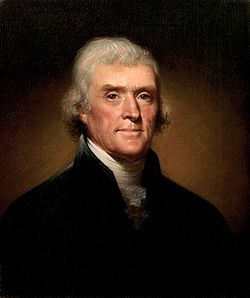 Thomas Jefferson U.S. Presidency Thomas Jefferson U.S. Presidency
- 10 Mar 1801—10 Mar 1801: First census puts the population of England and Wales at 9,168,000. Population of Britain nearly 11 million (75% rural)
- 10 May 1801—10 Jun 1805:
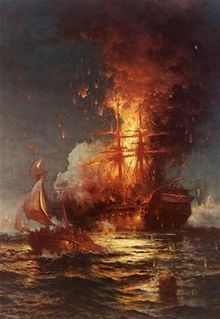 First Barbary War First Barbary War
- 24 Dec 1801—24 Dec 1801: Richard Trevithick built the first self-propelled passenger carrying road loco
|
| 5 | 1802 | - 25 Mar 1802—25 Mar 1802: Treaty of Amiens signed by Britain, France, Spain, and the Netherlands ? the 'Peace of Amiens' as it was known brought a temporary peace of 14 months during the Napoleonic Wars ? one of its most important cultural effects was that travel and correspondence across the English Channel became possible again
|
| 6 | 1803 | - 1803—1803: Poaching made a Capital offense in England if capture resisted
- 1803—1803: Richard Trevithick built another steam carriage and ran it in London as the first
self-propelled vehicle in the capital and the first London bus
- 1803—1803: Semaphore signaling perfected by Admiral Popham
- 30 Apr 1803—30 Apr 1803: Louisiana Purchase: Napoleon sells French possessions in America to United States
- 12 May 1803—12 May 1803: Peace of Amiens ends ? resumption of war with France ? The Napoleonic Wars (1803-18l5)
- 23 Jul 1803—23 Jul 1803: First public railway opens (Surrey Iron Railway, 9 miles from Wandsworth to
Croydon, horse-drawn)
|
| 7 | 1804 | - 1804—1804: Matthew Flinders recommends that the newly discovered country, New Holland, be renamed 'Australia'
- 21 Feb 1804—21 Feb 1804: Richard Trevithick runs his railway engine on the Penydarren Railway (9.5 miles
from Pen-y-Darren to Abercynon in South Wales) this hauled a train with 10 tons of
iron and 70 passengers. It was commemorated by the Royal Mint in 2004 in the form of
A ?2 coin.
- 3 Mar 1804—3 Mar 1804: John Wedgwood (eldest son of the potter Josiah Wedgwood) founds The Royal
Horticultural Society
- 2 Dec 1804—2 Dec 1804: Napoleon declares himself Emperor of the French
- 12 Dec 1804—12 Dec 1804: Spain declares war on Britain
|
| 8 | 1805 | - 1805—1805: London docks opened
- 21 Oct 1805—21 Oct 1805: Admiral Nelson's victory at Trafalgar
- 2 Dec 1805—2 Dec 1805: Battle of Austerlitz; Napoleon defeats Austrians and Russians
|
| 9 | 1806 | - 1806—1806: Dartmoor Prison opened (built by French prisoners)
- 9 Jan 1806—9 Jan 1806: Nelson buried in St Paul's cathedral, London
|
| 10 | 1807 | - 1807:
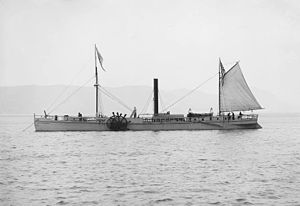 Fulton's First Steamboat Voyage Fulton's First Steamboat Voyage
- 25 Mar 1807—25 Mar 1807: Parliament passes Act prohibiting slavery and the importation of slaves from 1808 ? but does not prohibit colonial slavery
|
| 11 | 1808 | - 1808—1808: Gas lighting in London streets
- 13 Jul 1808—13 Jul 1808: 'Hot Wednesday' ? temperature of 101?F in the shade recorded in London
- 20 Dec 1808—20 Dec 1808: Beethoven premieres his Fifth Symphony, Sixth Symphony, Fourth Piano Concerto and Choral Fantasy together in Vienna
|
| 12 | 1809 | - 12 Feb 1809—12 Feb 1809: Birth of Charles Darwin
- 4 Mar 1809—4 Mar 1817:
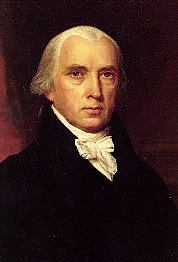 James Madison U.S. Presidency James Madison U.S. Presidency
- 18 Sep 1809—18 Sep 1809: Royal Opera House opens in London
|
| 13 | 1810 | - 1810—1810: John McAdam begins road construction in England, giving his name to the process of
road metalling
|
| 14 | 1811 | - 5 Feb 1811—5 Feb 1811: Prince of Wales (future George IV) made Regent after George III deemed insane
|
| 15 | 1812 | - 11 May 1812—11 May 1812: Prime Minister, Spencer Perceval, assassinated ? shot as he entered the House of Commons by a bankrupt Liverpool broker, John Bellingham, who was subsequently hanged
- 18 Jun 1812—18 Jun 1812: Start of American 'War of 1812' (to 1814) against England and Canada
- 18 Jun 1812—17 Feb 1815:
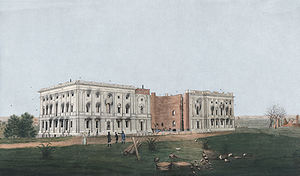 War of 1812 War of 1812
- Oct 1812—Oct 1812: Napoleon retreats from Moscow with catastrophic losses
|
| 16 | 1813 | - 1813—1813: Ireland: First recorded '12th of July' sectarian riots in Belfast
- 1813—1813: Jane Austen wrote 'Pride and Prejudice'
|
| 17 | 1814 | - 1 Jan 1814—1 Jan 1814: Invasion of France by Allies
- 6 Apr 1814—6 Apr 1814: Napoleon abdicates and is exiled to Elba
- 13 Aug 1814—13 Aug 1814: Convention of London signed, a treaty between the UK and the Dutch
- 24 Aug 1814—24 Aug 1814: The British burn the White House
- 29 Nov 1814—29 Nov 1814: 'The Times' first printed by a 'mechanical apparatus' (at 1100 sheets per hour)
- 24 Dec 1814—24 Dec 1814: Treaty of Ghent signed ending the 1812 war between Britain and the US
|
| 18 | 1815 | - 1815—1815: Trial by Jury established in Scotland
- 1815—1815: Davy develops the safety lamp for miners
- 3 Mar 1815—5 Dec 1815:
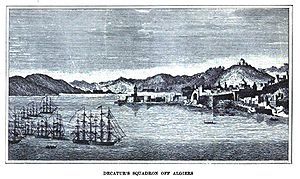 Second Barbary War Second Barbary War
- 18 Jun 1815—18 Jun 1815: The Battle of Waterloo: Napoleon defeated and exiled to St. Helena
- 18 Jun 1815:
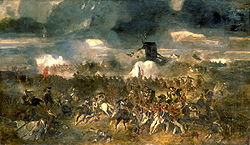 The Battle of Waterloo The Battle of Waterloo
|
| 19 | 1816 | - 1816—1816: Income tax abolished
- 1816—1816: For the first time British silver coins were produced with an intrinsic value substantially
below their face value ? the first official 'token' coinage
- 1816—1816: Climate: the 'year without a summer' ? followed a volcanic explosion of the mountain 'Tambora in Indonesia the previous year the biggest volcanic explosion in 10000 years
- 1816—1816: Large scale emigration to North America
- 1816—1816: Trans-Atlantic packet service begins
|
| 20 | 1817 | - 1817—1817: March of the Manchester Blanketeers; Habeas Corpus suspended
- 1817—1817: Constable painted 'Flatford Mill'
- 4 Mar 1817—4 Mar 1825:
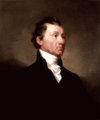 James Monroe U.S. Presidency James Monroe U.S. Presidency
|
| 21 | 1818 | - 1818—1818: Manchester cotton spinners' strike
- 20 Oct 1818—20 Oct 1818: 'Convention of 1818' signed between the United States and the United Kingdom
which, among other things, settled the US-Canada border on the 49th parallel for most of its
length
|



 Submit Photo / Document
Submit Photo / Document
